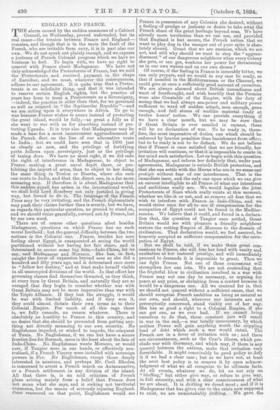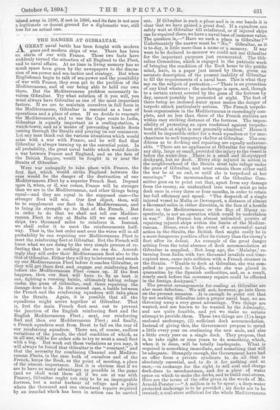ENGLAND AND FRANCE. T HE alarm caused by the sudden summons
of a Cabinet Council, on Wednesday, proved unfounded, but its real cause—the tension between France and England— remains, and though that is in the main the fault of the French, who are irritable from envy, it is in part also our own. We do not speak out plainly enough, and we express a jealousy of French Colonial progress which we have no business to feel. To begin with, we have no right to quarrel with France about Madagascar. We have not only acknowledged the Protectorate of France, but we sold the Protectorate and received payment in the shape of Zanzibar, and we must, whatever the consequences, adhere to our agreement. It is quite true that a Protec- torate is an indefinite thing, and that it was intended to reserve certain English rights, but the practice of years has been to treat a Protectorate as a Sovereignty, —indeed, the practice is older than that, for we governed as well as reigned in " the Septinsular Republic "—and we are acting upon it everywhere in Africa. To go to war because France wishes to annex instead of protecting the great island, would be folly,—as great a folly as if she went to war with us for absorbing instead of pro- tecting Uganda,. It is true also that Madagascar may be made a base for a most inconvenient aggrandisement of. the French fleet on the line of our alternative route to India ; but we could have seen that in 1890 just as clearly as now, and the privilege of fortifying ports follows upon sovereignty, just as the privilege of taxing does. We have no more right, if we did cede the right of interference in Madagascar, to object to France making a great naval (Topa there, or pro- hibiting the import of arms, than to object to her doing the same thing in Toulon or Biserta, where she cuts one route to India, and that the direct one, in afar more menacing way. If therefore it is about Madagascar that this sudden squall has arisen in the international world, we shall hold Lord Rosebery not only justified in giving way, but bound to do it. The language of the French Press may be very irritating, and the French diplomatists may push their claims further than is seemly, but we have, as regards this particular question, no ground to stand on, and we should retire gracefully, coerced not by France, but by our own word. There are of course other questions afoot besides Madagascar, questions on which France has no such moral foothold ; but the general difficulty between the two nations is the Colonial one. France, besides her sore feeling about Egypt, is exasperated at seeing the world partitioned without her having her fair share, and is determined to secure some big bits,—Indo-China, let us say, and Madagascar and Morocco. She has, in fact, caught the fever of expansion beyond seas as she did a hundred and fifty years ago, and is determined once more to " follow her destiny," and at least make herself visible in all unoccupied divisions of the world. In that effort her governing classes find themselves thwarted, as they think, at every turn by Great Britain, and naturally they are so enraged that they begin to consider whether war with Great Britain may not be more imperative than war with the Triple Alliance. If they lost the struggle, it would be war with limited liability, and if they won it, they could almost dictate their own terms as to their Colonial Empire. For much of all this rage there is, we fully concede, no reason whatever. There is absolutely no hostility to France in this country, and no desire that she should be prevented from getting any- thing not directly menacing to our own security. No Englishman impeded, or wished to impede, the conquest of Tunis. No Englishman, if we can but have a secure frontier-line for Burmah, cares in the least about the fate of Indo-China. No Englishman wants Morocco, or would care, if Tangier were in our hands, or effectively neu- tralised, if a French Viceroy were installed with sovereign powers in Fez. No Englishman, except those deeply interested in missions, and perhaps Mr. Cecil Rhodes, is concerned to arrest a French march on Antananarivo, or a French settlement in any division of the island. All that there is, is an acid criticism of French plans arising mainly from a belief that France does not mean what she says, and is seeking not territorial expansion, but the means of seriously injuring England. Once reassured on that point, Englishmen would see France in possession of any Colonies she desired, without a feeling of grudge or jealousy or desire to take away the French share of the great heritage beyond seas. We have already more territories than we can use, and provided that England is but secure, the French notion that we want to play dog in the manger out of pure spite is abso- lutely absurd. Grant that we are enemies, which we are not, and still why should we want to stop the " aggran- disement" of our dangerous neighbour when every Colony she gets, or can get, weakens her power for threatening i us in our own waters and on our own shores P Of course, if the feeling in France is incurably bitter, we can only prepare, and we would in any case be ready, so that if assailed in the Mediterannean or the Channel, we could give at once a sufficiently good account of ourselves. We are always alarmed about British unreadiness and want of forethought, and wish heartily that the Premier were also Constable of the Empire, with the duty of seeing that we had always sea-power and military power sufficient to ward off sudden attack, men enough, guns enough, and full stores of warlike material ready at twelve hours' notice. We can provide everything if we have a clear month, but we may be sure that if Great Britain is ever assailed in earnest, there will be no declaration of war. To be ready is, there- fore, the most imperative of duties, one which should be enforced by heavier penalties than banishment from office; but to be ready is not to be defiant. We do not believe that if France is once satisfied that we are friendly, her irritation will continue, or that it is impossible to create in her mind such satisfaction. Lot us begin with this question of Madagascar, and inform her definitely that, under past agreements, Madagascar is outside British protection, and that she can settle with the Havas, who are in no sense our: protelges without fear of our interference. That is the immediate issue, and the only one upon which we can give an earnest intelligible to all France of what our intentions and ambitions really are. We would legalise the joint Protectorate of Siam which really exists at this moment, whether we like it or not, and so remove all fear that we wish to interfere with France in Indo-China, and we would strive once for all to see if compensation for the occupation of Egypt could not be found in the Mediter- ranean. We believe that it could, and found in a declara- tion that, the question of Tangier once settled, Great Britain would see with pleasure a friendly neighbour restore the rotting Empire of Morocco to the domain of civilisation. That declaration would, we feel assured, be honestly accepted as sufficient compensation for the occu- pation of Egypt. But we shall be told, if we make these great con- cessions to France, she will lose her head with vanity and exultation at her restored prestige, and will immediately proceed to demands it is impossible to grant. Then we can fight France. Not one of these concessions will strengthen her one iota. We are not contending that the frightful blow to civilisation involved in a war with France may not one day be necessary, or arguing for peace at any price, or shrinking from a contest because it would be a dangerous one. All we contend for is, that we should not quarrel without a sufficient cause, that we should recognise French ambition as being as natural as our own, and should, wherever our interests are not peremptorily concerned, stand visibly out of her way. She has as good a right to a Colonial Empire, if she can get one, as we ever had. If we cannot bring ourselves to do that, these constant jars will result in war in the end,—a war totally unnecessary, by which neither Power will gain anything worth the crippling load of debt which such a war would entail. The French are in a fever of irritation with us ; and there are circumstances, such as the Czar's illness, which pre- clude war with Germany, and which may, if there is any quarrel between the nations, make that irritation very formidable. It might conceivably be good policy to defy it if we had a clear case ; but as we have not, at least the next best policy is to remove it by open acknow- ledgment of what we all recognise to be ultimate facts. At all events, whatever we do, let us not rely on " bluffing," but either give way, or refuse to give way, in full sincerity, and with a clear consciousness of what i we are about. It is drifting we dread most ; and if it is Madagascar that has given rise to the crisis now supposed to exist, we are unmistakably drifting. We gave the island away in 1890, if not in 1886, and its fate is not now a legitimate or decent ground for a diplomatic war, still less for an actual one.







































 Previous page
Previous page